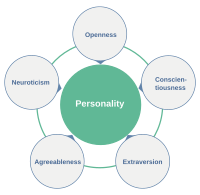
Photo from wikipedia
This study was framed within a quantitative research methodology to develop a concise measure of calculus self-efficacy with high psychometric properties. A survey research design was adopted in which 234… Click to show full abstract
This study was framed within a quantitative research methodology to develop a concise measure of calculus self-efficacy with high psychometric properties. A survey research design was adopted in which 234 engineering and economics students rated their confidence in solving year-one calculus tasks on a 15-item inventory. The results of a series of exploratory factor analyses using minimum rank factor analysis for factor extraction, oblique promin rotation, and parallel analysis for retaining extracted factors revealed a one-factor solution of the model. The final 13-item inventory was unidimensional with all eigenvalues greater than 0.42, an average communality of 0.74, and a 62.55% variance of the items being accounted for by the latent factor, i.e., calculus self-efficacy. The inventory was found to be reliable with an ordinal coefficient alpha of 0.90. Using Spearman’ rank coefficient, a significant positive correlation ρ ( 95 ) = 0.27 , p < 0.05 (2-tailed) was found between the deep approach to learning and calculus self-efficacy, and a negative correlation ρ ( 95 ) = − 0.26 , p < 0.05 (2-tailed) was found between the surface approach to learning and calculus self-efficacy. These suggest that students who adopt the deep approach to learning are confident in dealing with calculus exam problems while those who adopt the surface approach to learning are less confident in solving calculus exam problems.
Journal Title: Education Sciences
Year Published: 2019
Link to full text (if available)
Share on Social Media: Sign Up to like & get
recommendations!